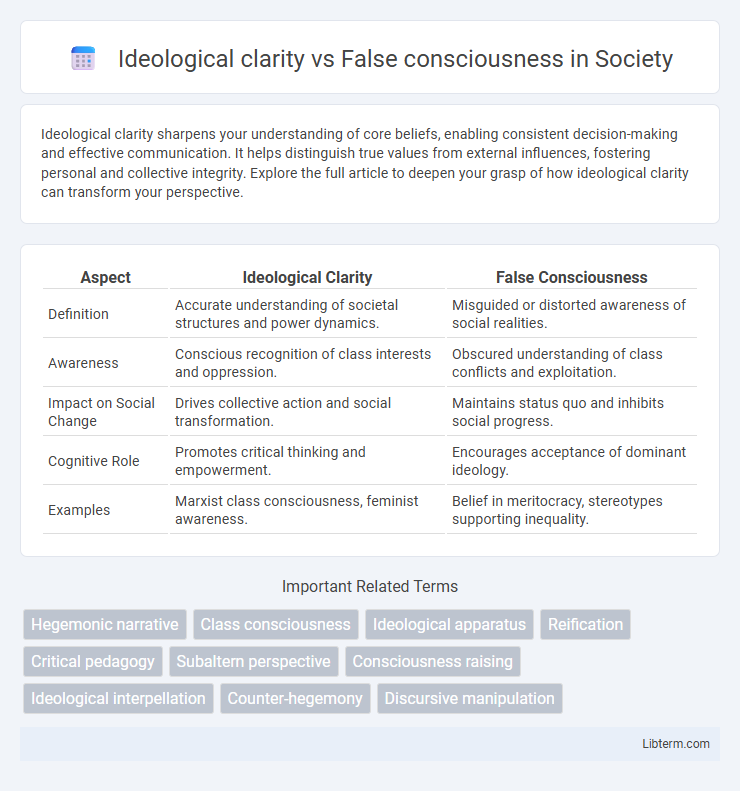Ideological clarity sharpens your understanding of core beliefs, enabling consistent decision-making and effective communication. It helps distinguish true values from external influences, fostering personal and collective integrity. Explore the full article to deepen your grasp of how ideological clarity can transform your perspective.
Table of Comparison
| Aspect | Ideological Clarity | False Consciousness |
|---|---|---|
| Definition | Accurate understanding of societal structures and power dynamics. | Misguided or distorted awareness of social realities. |
| Awareness | Conscious recognition of class interests and oppression. | Obscured understanding of class conflicts and exploitation. |
| Impact on Social Change | Drives collective action and social transformation. | Maintains status quo and inhibits social progress. |
| Cognitive Role | Promotes critical thinking and empowerment. | Encourages acceptance of dominant ideology. |
| Examples | Marxist class consciousness, feminist awareness. | Belief in meritocracy, stereotypes supporting inequality. |
Defining Ideological Clarity
Ideological clarity refers to a clear, coherent understanding of political beliefs and social realities, enabling individuals or groups to critically analyze power structures. False consciousness, by contrast, indicates a distorted awareness that obscures true social relations and perpetuates domination. Defining ideological clarity involves recognizing systemic inequalities and empowering informed, critical perspectives that challenge dominant narratives.
Understanding False Consciousness
False consciousness refers to the systematic misperception of social, political, or economic realities, often perpetuated by dominant ideologies that obscure true class interests. This concept challenges individuals' ability to recognize exploitation and inequality, leading them to accept and support structures that maintain their subordination. Understanding false consciousness is crucial for achieving ideological clarity, as it reveals how distorted beliefs hinder awareness of one's real conditions and potential for collective emancipation.
Historical Roots of Both Concepts
The concept of ideological clarity traces back to Marxist theory, emphasizing the importance of understanding social realities and class relations to achieve consciousness critical of dominant power structures. False consciousness originates from Marx and Engels' analysis of how dominant ideologies obscure class exploitation, preventing the proletariat from recognizing their true social position. Both concepts emerged in the 19th century during the rise of industrial capitalism as tools to analyze the dynamics of class struggle and social awareness.
How Ideology Shapes Perception
Ideological clarity enables individuals to perceive social realities with critical awareness, distinguishing power structures and systemic inequalities clearly. False consciousness, in contrast, distorts perception by embedding dominant ideology within individuals' beliefs, leading them to misinterpret or accept exploitative social relations as natural or beneficial. This ideological shaping of perception controls cognitive frameworks, influencing social behavior and reinforcing existing hierarchies.
Mechanisms of False Consciousness
False consciousness functions through mechanisms such as ideological state apparatuses, cultural hegemony, and mass media manipulation, which distort individuals' understanding of their social conditions and interests. These mechanisms embed dominant class ideologies into everyday beliefs, preventing awareness of exploitation and maintaining social hierarchies. Ideological clarity breaks through these distortions by promoting critical consciousness and class awareness, enabling individuals to recognize structural inequalities and challenge prevailing power relations.
The Role of Critical Thinking
Critical thinking plays a pivotal role in distinguishing ideological clarity from false consciousness by enabling individuals to critically analyze societal structures, question dominant narratives, and recognize underlying power dynamics. It fosters an awareness of personal biases and social influences, allowing for a clearer understanding of true interests versus manipulated beliefs. Developing critical thinking skills is essential for overcoming false consciousness and achieving genuine ideological clarity.
Social Implications of Ideological Clarity
Ideological clarity fosters critical awareness among individuals, enabling them to recognize systemic inequalities and challenge dominant power structures effectively. It empowers social movements to articulate goals clearly, mobilize collective action, and drive transformative social change. The absence of such clarity often perpetuates false consciousness, maintaining social hierarchies and inhibiting progressive development.
Overcoming False Consciousness
Overcoming false consciousness requires critical awareness of social and economic realities that distort individual perceptions of class interests. Ideological clarity emerges through education, reflexive critique, and collective consciousness-raising, enabling marginalized groups to recognize systemic oppression and mobilize for transformative change. This process dismantles ingrained misconceptions perpetuated by dominant ideologies, fostering genuine social empowerment.
Contemporary Examples and Case Studies
Ideological clarity enables individuals to critically analyze social structures, as seen in contemporary protests addressing systemic racism where activists recognize the root causes of inequality. Conversely, false consciousness manifests in misdirected blame or acceptance of oppressive norms, exemplified by workers supporting policies that undermine labor rights due to misleading political rhetoric. Case studies on climate change denial reveal how ideological clarity fosters informed activism, while false consciousness perpetuates environmental inaction through manipulated narratives.
Pathways Toward Ideological Awareness
Pathways toward ideological awareness involve critical education, reflective thinking, and exposure to diverse perspectives, enabling individuals to challenge false consciousness and recognize underlying social structures and power dynamics. Developing ideological clarity requires disentangling internalized beliefs shaped by dominant ideologies from authentic self-awareness, which fosters informed political engagement and social transformation. Emphasizing critical pedagogy and dialogical practices accelerates the transition from false consciousness to a nuanced understanding of ideological forces shaping societal norms.
Ideological clarity Infographic

 libterm.com
libterm.com